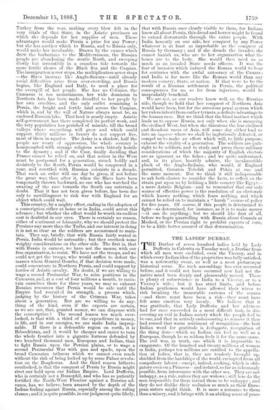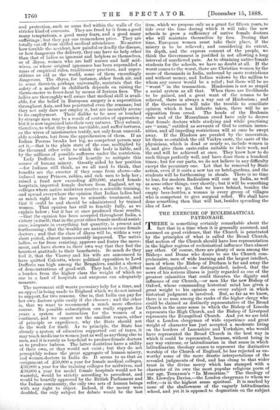THE LADIES' DURBAR. T HE Durbar of seven hundred ladies held
by Lady Dufferin in Calcutta on Tuesday week, a Durbar from which all men were excluded, even the Viceroy, and in which every Indian idea of the proprieties was fully satisfied, was a noteworthy event, as well as a most picturesque historical scene. No such assemblage has ever occurred before, and it could not have occurred now had not the native mind been deeply and pleasurably moved. There is plenty of subservience in India to a Viceroy, or to a Viceroy's wife ; but it has strict limits, and before Indian gentlemen would have allowed their wives to risk breaking the immutable customs of the zenana —and there must have been a risk—they must have felt some emotion very keenly. We believe that it was gratitude, that Lady Dufferin and her advisers had for once succeeded in a most difficult task, in dis- covering an evil in Indian society which the people feel to be one, and that in actively endeavouring to remove it they had roused that warm sentiment of recognition—the best Indian word for gratitude is kritogyata, recognition of the thing done—which an Indian can feel as well as a European, though he so seldom feels it for the same cause. The evil was, in truth, one which it is impossible to exaggerate. Of the hundred and twenty millions of women in India, perhaps ten millions are entitled to the appella- tion of ladies, that is, they are tenderly brought up, shielded from the hardships of the world, exempted from all compulsory labour—except, indeed, cooking, which is obli- gatory even on a Princess—and isolated, so far as is humanly possible, from intercourse with the other sex. They are not unhappy, as a rule, unless they are widows ; still less do the men responsible for them intend them to be unhappy ; and they do not dislike their seclusion so much as their Euro- pean sisters might think. It is more a nuisance to them than a misery, and it brings with it an abiding sense of peace and protection, such as nuns feel within the walls of the stricter kind of convents. They are freed by it from a good many temptations, a good many fears, and a good many sufferings ; but they pay one tremendous price. They are totally cut off from skilled medical attendance. No matter how terrible the accident, how painful or deadly the disease, or how dangerous the delivery, they can have no help other than that of ladies as ignorant and helpless as themselves, or of dhyes, women who are half nurses and half mid- wives, on whose original ignorance has been superadded mass of empirical rules, traditionary practices, and super- stitions as old as the world, some of them exceedingly dangerous. The dhyes, for instance, abhor fresh air, and in some districts, perhaps universally, maintain that the safety of a mother in childbirth depends on raising the thermometer to fever-heat by means of furious fires. The ladies are thoroughly well aware that medical skill is avail- able, for the belief in European surgery is a superstition throughout Asia, and has penetrated even the zenanas; but they not only dare not employ it, but are incurably averse to its employment. Their dislike to be seen or touched by strange men may be a result of centuries of oppression ; but it is now ingrained into their very natures. They submit, therefore, to what they deem inevitable, and suffer tortures, as the wives of missionaries testify, not only from unavoid- able accidents, but from the apprehension of them. If an Indian Peeress breaks her leg, no competent person may set it,—that is the plain state of the case, multiplied by the thousand other evils to which the body is liable, and by the millions of possible sufferers under the restriction. Lady Dufferin set herself heartily to mitigate this source of human misery. Greatly aided by her position —for Indians still think, as we all used to think, that benefits are the sweeter if they come from above—she induced many Princes, nobles, and rich men to help her ; raised a fund now exceeding £70,000, started female hospitals, imported female doctors from England, set up .colleges where native midwives receive a scientific training, .and spread everywhere the opinion that Indian ladies had as much right as the men to scientific treatment, and that it could be and should be administered by trained women. That opinion has still to fructify fully, as we explain below ; but it has at once produced these results, —that the opinion has been accepted throughout India, a victory in itself; that in the great cities female medical assist- ance, adequate in everything but quantity, is present and forthcoming ; that the wealthy are anxious to secure female doctors ; and that the class of dhyes will be, within a very short period, almost immeasurably improved. The native ladies, so far from resisting, approve and foster the move- ment, and have shown in their own way that they feel the heartiest gratitude to their benefactrix. So much do they feel it, that the Viceroy and his wife are announced to have quitted Calcutta, where political opposition to Lord Dufferin ran high among the Bengalees, amidst a shower of demonstrations of good-will. They had, in fact, lifted a burden from the higher class the weight of which no one in a land of hospitals and surgeons can adequately measure.
The movement still wants pecuniary help for a time, and an appeal is being made to England which we do not intend to support, for two reasons. One is, that India can pay for her own doctors quite easily if she chooses ; and the other is, that we want to recommend a much more effective course. No possible subscription can really support for years a system of instruction for the women of a continent, and we cannot see the smallest reason, either of principle or expediency, why the State should not do the work for itself. As to principle, the State has already a system of education supported out of taxes, it may teach medicine to women just as well as anything else to men, and it is surely as beneficial to produce female doctors as to produce baboos. The latter doubtless have a utility of their own, or they would not exist ; but they do not perceptibly reduce the great aggregate of human misery, and women-doctors in India do. It seems to us that- an assignment of £50,000 a year for female medical colleges, £50,000 a year for the training colleges for midwives, and £50,000 a year for model female hospitals would not be wasteful, would be strictly according to precedent, and would be heartily approved by the British Parliament and the Indian community, the only two sets of human beings with any right to object. Indeed, if the money were doubled, the only subject for debate would be the last item, which we propose only as a grant for fifteen years, to tide over the time during which it will take the new schools to grow a sufficiency of native female doctors who will maintain themselves by fees. During that time, European women must take their place, if the misery is to be relieved ; and considering its extent, its depth, and the express consent of the people, we think the Government is justified in not allowing a long interval of unrelieved pain. As to obtaining native female students for the schools, we have no doubt at all. If the worst comes to the worst, there are Christian women by the score of thousands in India, unbound by caste restrictions and without money, and Indian widows by the million to whom any career would be a relief; but there will be no " worst " in the transaction. Hindooism is not so stupid a social system as all that. When there are livelihoods to be gained, and a great want of the zenana to be relieved, there is always a way out of Hindooism ; and if the Government will take the trouble to conciliate opinion which it has hitherto taken, there will be no opposition from creed. The heads of the Brahmin caste and of the Mussulman creed have only to decree that female doctors while studying and while practising are " nuns," entitled as servants of God to certain immu- nities, and all impeding restrictions will at once be swept away. If the Hindoos are puzzled by the innovation, let them re-establish the old Vaidya caste, the caste of the physicians, which is dead or nearly so, include women in it, and give them caste-rules suitable to their work, and the end will be achieved at once. They know how to do such things perfectly well, and have done them a hundred times ; but for our parts, we do not believe in any difficulty except the pecuniary one. Let that be removed by State action, even if it costs a new tax on betel-gardens, and the students will be forthcoming in shoals. There is no time to lose, for modern Radicalism will cost us India, as well as some other things, very shortly; but it will be something to say, when we go, that we leave behind, besides the empty beer-bottles, a woman in every group of villages who is competent to give surgical relief. We shall have done something then that will last, besides spreading the idea of Law.















































 Previous page
Previous page